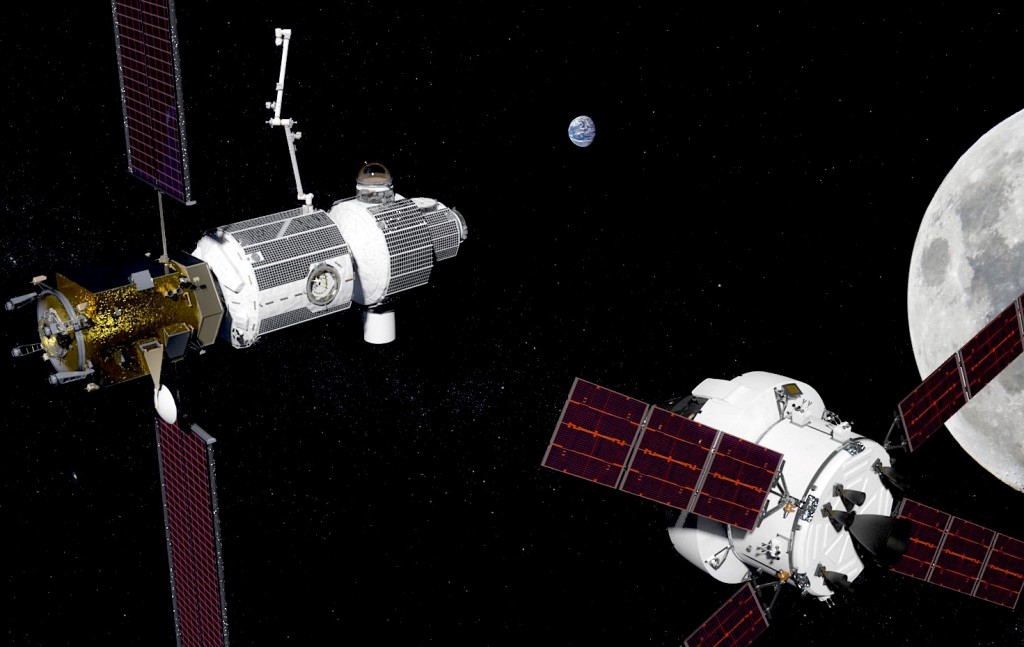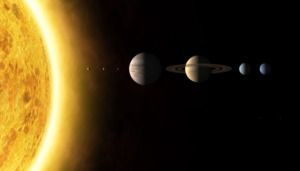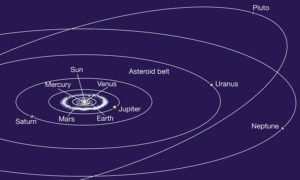Tag: moon

Crashed spacecraft may have left creatures on the moon
(CNN)You’ve heard of men on the moon — but what about moss piglets?
Source: https://www.cnn.com/2019/08/07/world/water-bear-space-intl-scli-scn/index.html


Solar System Map: Surprisingly deceptive
What’s wrong with this illustration of the planets in our solar system? »
For one thing, it suggests that the planets line up for photos on the same solar ray, just like baby ducks in a row. That’s a pretty rare occurrence—perhaps once in several billion years. In fact, Pluto doesn’t even orbit on the same plane as the planets. Its orbit is tilted 17 degrees.  So, forget it lining up with anything, except on rare occasions, when it crosses the equatorial plane. On that day, you might get it to line up with one or two planets.
So, forget it lining up with anything, except on rare occasions, when it crosses the equatorial plane. On that day, you might get it to line up with one or two planets.
But what about scale? Space is so vast. Perhaps our solar system looks like this ↓
No such luck! Stars and planets do not fill a significant volume of the void. They are lonely specs in the great enveloping cosmic dark.*  Space is mostly filled with—well—space! Lots and lots of it. In fact, if Pluto and our own moon were represented by just a single pixel on your computer screen, you wouldn’t see anything around it. Even if you daisy chain a few hundred computer screens, you will not discern the outer planets. They are just too far away.
Space is mostly filled with—well—space! Lots and lots of it. In fact, if Pluto and our own moon were represented by just a single pixel on your computer screen, you wouldn’t see anything around it. Even if you daisy chain a few hundred computer screens, you will not discern the outer planets. They are just too far away.
Josh Worth has created an interactive map of our solar system. For convenience, it also assumes that planets are lined up like ducks. But the relative sizes and distance between planets are accurate. Prepare to change your view of the cosmos…

Just swipe your finger from the right edge of the screen to move away from the sun. Despite a fascinating experience (and many cute, provocative Easter eggs hidden between the planets), few readers swipe all the way out to Pluto and the author credits. On my high-resolution monitor, it requires more than a thousand swipes. Imagine if the Moon had been more than 1 pixel…It would take a long, long time! I would rather go out to dinner and a movie. But I urge you to travel at least to Jupiter. At 1/7 of the trip to Pluto, it should take less than 5 minutes.
On this scale, you won’t see the 1½ or 2 million asteroids between Mars and Jupiter. They aren’t large enough to merit a pixel. As Josh states, “Most space charts leave out the most significant part – all the space.” (an Easter egg at 1.12 billion km on the map).
* I borrowed this phrase from my former Cornell professor, Carl Sagan. He uses it in Pale Blue Dot [timestamp 2:14.]. This video tribute became a touchstone in my life; even more than having Sagan as a professor and mentor.
If you view it, be sure to also view Consider Again, Sagan’s follow-up in the video below. It is a thought-provoking observation of human-chauvinism throughout history—even among ancient Greeks. Carl isn’t the first atheist, of course. But he is eloquent in describing mankind’s ego trip: The delusion of a privileged place in the universe, or the religious depiction of God and his relationship with our species.
Related:
- Carl Sagan Pale Blue Dot, a most impactful short video
- Consider Again the Pale Blue Dot, the arrogance of man throughout history
- Scale of the Universe: Powers of 10 (Charles & Ray Eames)
- Learn more about Charles and Ray Eames at Snore & Guzzle
- Our Universe is Finely Tuned for Life—Why?
Credit: ▪ Josh Worth and Sachin Gadhave who offers an illustrative answer at Quora.com
Philip Raymond co-chairs Crypsa & Bitcoin Event, columnist & board member at Lifeboat, editor
at WildDuck and will deliver the keynote address at Digital Currency Summit in Johannesburg.
From Lunar Return to the First Colony
What would it take to go from a manned human return to the Moon to a self-sustaining colony?
When we look at modern society today, there is practically no city that is self-sufficient. Metals are produced in one part of the world, paper somewhere else, cell phones yet somewhere else. The list could go on.
But this situation exists because no city truly needs to be self-sufficient. People can purchase goods from wherever they can be produced at the best price and quality.
So, are there no places on Earth that are self-sufficient? Actually, there are.
Self-sufficient places tend to be rural and poor. For example, islanders have survived for many centuries hunting fish and gathering or growing basic food stuff.
But neither the examples of urban or rural settings are altogether helpful in determining what it would take to go from a manned lunar landing to the first self-sufficient colony. The reason is that the simple rural environment provides ready resources which are not available on the Moon. These six fundamental things are: air, water, food, protection from cosmic radiation, temperature control, and sufficient gravity.
So, what would it take to secure these on a self-sustaining basis? Would one need much of the technologies which modern civilization offers or could there be a small set of technologies which are sufficient and themselves could be replaced indefinitely?
The six fundamental things not easily available on the Moon can none-the-less be developed. For example, plants require carbon and nitrogen (among other things). Carbon and nitrogen is present in adequate amounts in the icy regolith of the lunar poles. But what would it take to get that? One cannot send a colonist out with a shovel because, in time, they would be exposed to too much radiation. So telerobotic mining equipment may be necessary. But then how could the various parts of a pretty sophisticated piece of equipment be produced in a self-sustaining way? Does one need a full civilization of tens of thousands of people in an integrated economy? Or, could creativity be used to create a telerobot that works adequately but which may be wire controlled. Before the advent of integrated circuits, engineers had to use their creativity to solve problems like these.
So, my appeal is that those with the technical know how need to figure out just what exactly is the lowest technologic way to achieve a self-sustaining off-Earth colony. If it can be figured out how to achieve these things with a relatively small colony, then we may be able to achieve he first self-sustaining colony within a relatively short while after humans return to the Moon.
The Difference Between a Lunar Base and Colony
Recently, Newt Gingrich made a speech indicating that, if elected, he would want 10% of NASA’s budget ($1.7 billion per year) set aside to fund large prizes incentivizing private industry to develop a permanent lunar base, a new propulsion method, and eventually establishing a martian base.
THE FINANCIAL FEASIBILITY OF A LUNAR BASE
Commentators generally made fun of his speech with the most common phrase used being “grandiose”. Perhaps. But in 1996 the Human Lunar Return study estimated $2.5 billion from NASA to send and return a human crew to the Moon. That was before SpaceX was able to demonstrate significant reductions in launch costs. One government study indicated 1/3 of the cost compared to traditional acquisition methods. Two of SpaceX’s Falcon Heavies will be able to launch nearly as much payload as the Saturn V while doing so at 1/15th the cost of the same mass delivered by the Shuttle.
So, we may be at the place where a manned lunar base is within reach even if we were to direct only 10% of NASA’s budget to achieve it.
I’m not talking about going to Mars with the need for shielding but rather to make fast dashes to the Moon and have our astronauts live under Moon dirt (regolith) shielding while exploiting lunar ice for air, water, and hence food.
IS A SMALL COLONY WITHIN REACH?
But the point of this post is this. If a small lunar base is within our reach, how much more would it take to achieve something that most of us realize would be the single most important step in ensuring the survival of the human species should a truly existential event strike Planet Earth. So I’m describing a small, self-sufficient colony. I would say that the difference between a base and a self-sufficient colony is fairly small. Small enough to make it worth our while to attempt to achieve.
THE MOST ESSENTIAL REQUIREMENTS
So, what are the requirements for a self-sufficient colony? The most critical would be air, water, and food. But understand, oxygen and water can be produced from the 600 million metric meters of water ice estimated to exist at the north lunar pole. So there’s no shortage. And with recycling, the amount of daily required input could be pretty small — small enough to easily be within a day’s task for mining. But food also requires fertilizer. Fortunately for us, the LCROSS results showed that there is also methane and ammonia in the ice and the regolith contains other minerals such as phosphorus and potassium. So, the most critical components for a colony would already be present with a manned base at a lunar pole.
HABITATS
Besides this, the colony would also need protection from the vacuum and cosmic radiation — i.e. a sealed habitat. This should not be too difficult. For a base, options include inflatable habitats and using fuel tanks as durable, sealable compartments. Radiation protection is as simple as piling regolith over the structures or even digging trenches or caves into the sides of hills or craters. That’s fine for a base. But a self-sufficient colony requires that future colonists be able to construct their own habitats. This could be achieved in the intermediate term by simply caving out habitats, supporting them, and then inflating a liner. Many such liners could be delivered in a single 5,000 kg payload. In the long term, such liners could be produced as plastics from volatiles resulting from the production of water from lunar ice. Broken liners could be patched or even melted to produce new liners. Alternately, metals can be fairly easily produced from the regolith. Run a permanent magnet through the soil, extract iron, melt it using solar concentrating mirrors and then process the molten metal to sheets, wires, cast forms, etc. Glass could be made the same way along with fiberglass. Natural lighting could supplement electrical power by using aluminum mirrors and glass. Supplemental heat could be provided in a similar manner along with locally derived insulation.
ELECTRICITY
Thin film solar panels can provide > 1,000 W/kg. So a 5,000 kg payload could provide a very large amount of onging power (if my math is correct, enough for perhaps 500 colonists). Excessive solar panels could be stored under ground and then used as needed thereby giving the colony decades of power. Eventually, a self-sustaining colony would need to produce its own power from silicon in the regolith. Storage of energy during the lunar night could be accomplished through the use of electrolysis of water to oxygen and hydrogen. These could then be recombined in a fuel cell to produce electricity and heat. Alternately, the colonists could simply travel every two weeks to the other side of the hill near the pole to another sunlit habitat.
CLOTHING
Again, to buy the colony time to be able to develop the ability to produce its own space suits, many years’ worth of thin airproof liners to space suits could be delivered in a single 5,000 kg payload. Again, a self-sustaining colony would need to eventually produce their own. Between the use of fiberglass, metals, and locally produced plastic or silicon sealants, eventually the colony could produce their own. Of course plants could be grown to provide fibers for clothing.
EQUIPMENT
To avoid day-long exposure to cosmic radiation while mining surface ice, mining could either be conducted underground or telerobotically. But regolith is very gritty and can wear out teleoperated mining equipment. But if a colony is able to produce its own metals and had machining equipment which could be used to produce more machining equipment, then the colony could stay ahead of equipment wearing out.
High-tech equipment (computer chips, cameras, and radio equipment) is certainly useful but I believe that there are ways around needing them. Still, in the interim, a single 5,000 kg payload delivery could provide centuries worth of computer chips, camera chips, and critical radio equipment components. For example, the Voyager craft have been exposed to 30+ years of 360 degree space radiation yet still work fine. So, an apple box worth of computer chips could last centuries. Eventually the colony would need to produce its own high-tech equipment. Perhaps they could use 1940’s technology such as vacuum tubes.
GRAVITY & PREGNANCY
The Moon’s 1/6 gravity is probably not enough to prevent bone and muscle loss. Experiments on the international space station (ISS) show that an exercise program can do much to prevent bone loss. A recent study indicates that Fosamax prevents bone loss in astronauts. A 5,000 kg payload could give 83 million doses of Fosamax. Stored in a permanently shadowed area, it could provide for a very large number of future colonists. But also, a basic centrifuge or even a tether ball-like contraption could provide artificial gravity for colonists for part of the day. Trenches dug along its path could provide partial protection from cosmic rays. Alternately, space forums have discussed completely underground centrifuges using various ingenious approaches.
Of particular concern is how fetal children would develop given limited gravity. Studies of animals on the ISS indicates that this is a real concern. We don’t know enough about this issue. Perhaps pregnant women would need to spend significant amounts of time in a centrifuge perhaps in all trimesters.
ADDITIONAL REQUIREMENTS
I have started with the most essential requirements and have worked down. I propose that there are technologic solutions for each of the requirements but perhaps I have been unrealistic in one or more areas or perhaps have neglected to address an important requirement. Feel free to comment below.
GENETIC DIVERSITY
For a truly self-sustaining colony, for humans, the Minimum Viable Population (MVP) is in the realm 1,000. I personally suspect that it is actually less than that but a solution here could be for a single payload delivery of frozen embryos for surrogate parenting to be frozen long-term in permanently shadowed areas. Although this may strike some as being unethical, these would only be needed in the event of a truly existential event on Planet Earth.
PRESERVING THE BIOSPHERE
I envision the colony as not only securing the human species but a good representation of Earth’s entire biosphere. But discussing the details of that topic would extend this post much longer than it has already become. More on that later.
Economics and Survival: An In-space 2-for-1 Bargain
There is growing recognition that the Moon is the logical next step for sustainably opening space to human settlement. It is now confirmed that both lunar poles contain appreciable quantities of ice containing water and also carbon and nitrogen containing compounds. Since the Moon is always only a 3-day trip away, it easily beats low-gravity asteroids as the most economic place to mine water ice. Similarly, since the Moon has only a 3-second roundtrip communications delay, teleoperated robots could mine and process the lunar ice at a fraction of what human miners would cost. That ice, brought back to Low Earth Orbit (LEO) could establish a new space economy including on-orbit refueling, boosting large communications satellites to GEO, sending tourists around or even to the Moon, and facilitating NASAs Beyond Earth Orbit activities. So the Moon is a great place to develop economic in-space resources.
But, what does all of this do with survival?
Amongst those people who understand extinction risks to humanity, it is generally recognized that an off-Earth, self-sufficient colony would go a very long ways to ensuring the survival of humanity as a species. An orbiting colony would not be a good choice because, if the Earth’s biosphere were contaminated with an ecophage, the Earth itself would not anymore be a source of supplies, and Earth orbit contains no resources except for sunlight. Mars, an asteroid, or a distant moon could be a location for an off-Earth colony, but all of these would be considerably more expensive to establish than on the Moon. For those of us who think it prudent that we should purchase “insurance” against the extinction of humanity sooner rather than later, the least expensive location makes the most sense. So the Moon is a great place to establish a colony for the purpose of survival.
Interesting, so the Moon is the best place for both economics and survival. Perhaps the two could be combined into a single program. But, in the Age of Austerity, it is unlikely that our governments are going to fund a large new space program. So how can this be done economically?
Three of some of the most encouraging developments in space are:
- the lower launch prices that SpaceX is offering including their large Falcon Heavy,
- the success of the Commercial Orbital Transportation Service (COTS), and
- the incredibly cheap development of small lunar landers thanks to the X-Prizes.
This suggests that there is an inexpensive path to two COTS-like programs:
1) a Commercial Cis-lunar Tranportation Service and
2) a Commercial Lunar Ice Development Service
More details could be given regarding the technical details of how these programs would work but are beyond the scope of this article. Rather, let’s look at how close a lunar ice development venture get a manned base towards full self-sufficiency.
Lunar ice would give drinkable water, breathable oxygen, and the carbon and nitrogen volatiles which would be needed for growing plants. Lunar soil would provide other needed nutrients. So lunar ice mining would already be providing life support supplies greater than what a small colony would need thereby allowing for lengthy stays in an underground shelter. Solar concentrators would provide enough heat to melt regolith allowing for the production of metals, glass, fiberglass, ceramics and such.
But the Moon is a harsh environment requiring high-tech tools just to survive. But one box delivered to the surface of the Moon could provide a hundred years worth of computer chips, or cameras, or air-proof space suit liners thereby buying the colony many years to eventually develop their own technology. So, in a relatively short period of time a self-sufficient lunar colony could be established. Then provide it with deliveries of frozen embryos, seeds, eggs, DNA, and microfiche information and you have the makings for the reboot of a new civilization and biosphere eventually on Mars.
The point of this article is that on off-Earth, self-sufficient colony is not that far away and could be a relatively modest additional step for an economically viable lunar ice operation.


